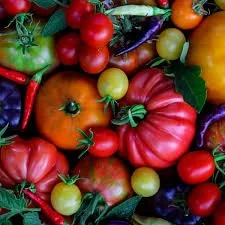To start, what are nightshade vegetables? Nightshade vegetables belong to the Solanaceae family and while there are over 2000 members, the most common include the following:
Common Nightshades:
Tomatoes
White potatoes – this includes potato starch and yes, French fries
Peppers – all types, including bell peppers of all colors and hot chili peppers like jalapenos, habanero, and cayenne
Eggplant
Tomatillo
Goji berries
Paprika
Ashwagandha
Are Nightshade Vegetables Safe?
Nightshades contain alkaloids, which in very large doses, can be toxic. That said, they are safe to eat in typical portions. The primary culprit is solanine, which partially functions to repel insects and animals. There has been discussion as to whether or not nightshade vegetables increase inflammation, both in the gut and joints.
Nightshades & Inflammation
Studies are mixed. An arthritis study that focused on following an anti-inflammatory diet recommended to avoid eating nightshade vegetables due to their potential for triggering arthritis. At the same time, however, there are some studies that suggest that these vegetables have anti-inflammatory effects, particularly tomatoes, goji berries, and purple potatoes. A recent study found that tomato intake did not influence the inflammatory biomarkers serum c-reactive protein (CRP) or interleukin-6 (IL-6), but did favorably reduce serum tumor necrosis factor alpha (TNF-a) levels.
The glycoalkaloid compounds in the nightshade vegetables have the potentialto disrupt the intestinal cell lining and activate mast cells in the gut mucosa, which can lead to adverse symptoms. Mast cells are immune cells and influence allergic reactions. Mast cells have been implicated in various intestinal disorders, including inflammatory bowel disease (IBD) and irritable bowel syndrome (IBS). Research has found that nightshade vegetables can directly activate mast cells in the GI tract. This evidence suggests that foods in the nightshade family may contribute to worsening gut symptoms in people with functional and inflammatory gastrointestinal disorders.
Joint Pain
A rheumatoid arthritis (RA) trial suggested that those with RA avoid nightshade vegetables as they may increase joint pain.
Latex Allergy?
If you are allergic to natural rubber latex, you may be more likely to not tolerate consumption of nightshade vegetables due to cross reactivity. The Latex-Fruit syndrome describes an association where 30-50% of those allergic to rubber latex show an associated hypersensitivity to foods in the nightshade family.
Bottom Line:
We need more research on the effects of nightshade vegetables on inflammation. We will likely find that not everyone needs to avoid this vegetable family, but there may be some of you who feel better when you’re not consuming these vegetables. If you’re unsure, follow a nightshade-free diet trial for two weeks and see if you feel any different and then add back to your diet. If symptoms flare, it would be advisable to avoid this family for a few months and then reassess. If you tolerate nightshade vegetables, you may include them.
For most of us, it’s wise to follow an anti-inflammatory diet and lifestyle plan rich in colorful vegetables and fruit, healthy fats, clean proteins and doing our best to limit or avoid sugar and processed foods.
How you store fruits & vegetables can also influence taste.
For optimal flavor, see the storage chart below.
Storage LocationFruitsVegetables
Store in the produce drawers of the refrigerator.
Separate fruits from vegetables to minimize the effects of ethylene on the vegetables.
Apples (> 7 days)
Apricots
Asian pears
Blackberries
Blueberries
Cherries
Cut fruits
Figs
Grapes
Raspberries
StrawberriesArtichokes
Asparagus
Beets
Belgian endive
Broccoli
Brussels sprouts
Cabbage
Carrots
Cauliflower
Celery
Corn
Cut vegetables
Green beans
Herbs (not basil)
Leafy vegetables
Leeks
Lettuce
Lima beans
Mushrooms
Peas
Radishes
Scallions
Spinach
Sprouts
Summer squash
Ripen on the counter first, then store in the refrigerator.
Avocados
Kiwi
Nectarines
Peaches
Pears
Plums
Store at room temperature.
Apples
Bananas
Grapefruit
Lemons
Limes
Mandarins
Mangos
Oranges
Papayas
Persimmons
Pineapple
Plantain
Pomegranate
WatermelonBasil
Cucumbers
Eggplant
Garlic*
Ginger
Jicama
Onions*
Peppers
Potatoes*
Pumpkins
Winter squash
Sweet potatoes*
Tomatoes
*Store garlic, onions, potatoes, and sweet potatoes in a well-ventilated area. Protect potatoes from light to avoid greening.
It's officially spring - I've certainly enjoyed the recent warm sunny days, hope you have as well.
In Health,
Natalie

